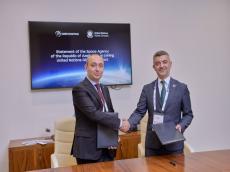|
|
TODAY.AZ / Business
Azercosmos joins UN Global Compact initiative
15 November 2023 [11:39] - TODAY.AZ
 By Azernews
By AzernewsThe Space Agency (Azerkosmos) under the Ministry of Digital Development and Transport has signed a cooperation document with the United Nations (UN) Office in Azerbaijan on joining the UN Global Compact initiative. This is reported with reference to "Azerkosmos", Azernews reports.
According to the report, by joining the Global Compact, the agency will have the opportunity to plan and implement sustainable development in the field of space activities, strengthen its internal capabilities, and share its experience with the wider business community and other stakeholders at the international level. It is also planned to exchange experiences between Azercosmos and the UN and to discuss the "Azercosmos Report on the Assessment of the Impacts of Global Climate Change".
"Azercosmos" as a participant in the UN "Global Agreement," will adapt its activities to the country's sustainable development priorities, directions for "green" development, policies, and commitments, including the "framework for cooperation in the field of sustainable development" covering 2021–2025 and the UN's experience on 17 goals related to sustainable development.
The role of space technologies is of particular importance in the UN document "Transforming Our World: The 2030 Agenda for Sustainable Development," consisting of 17 goals. The use of space technologies in the economic, social, and environmental spheres, which are integrated with each other, is now very relevant. From this point of view, we see the direct and indirect benefits of space technology in these areas.
For example, if a satellite image helps a farmer increase his productivity, that is a direct contribution and result. If it affects more global goals, such as poverty reduction, it is considered an indirect effect of improving agricultural efficiency. In short, the power of space is being harnessed to address the big problems and global challenges facing the world.
The Global Compact, founded in 2000 at the initiative of the United Nations, is the world's largest corporate sustainability network, with more than 20,000 business and non-business partners in over 160 countries. The main goal of Global Compact participants is to adapt their strategies and activities to internationally recognised principles of human rights, labour rights, environmental protection, and the 2030 Agenda for Sustainable Development.
URL: http://www.today.az/news/business/241254.html
 Print version
Print version
Connect with us. Get latest news and updates.
See Also
- 16 January 2025 [15:24]
Franklin Templeton group includes several business entities with total assets worth over trillion - 16 January 2025 [13:20]
Committee Chairman highlights customs coordination for enhanced trade & regional integration - 16 January 2025 [12:21]
Biden's gift to Trump: what does the US 'partnership' with Armenia hide? - 16 January 2025 [12:18]
Customs cooperation among Turkic states deepens at 10th meeting in Baku - 16 January 2025 [12:02]
Azerbaijani Minister meets with ITU Director Kosmas Zavazava - 16 January 2025 [10:43]
New leadership appointed to Azerbaijan's Innovation and Digital Development Agency - 15 January 2025 [15:53]
Uzbekistan to develop transit routes to Europe via Azerbaijan - 14 January 2025 [15:36]
Azerbaijan and Islamic Development Bank discuss strategic partnership for next decade - 13 January 2025 [15:11]
CBA updates customer compliance rules for electronic fund transfers - 13 January 2025 [13:05]
Heydar Aliyev International Airport sees record growth in 2024, gains global recognition
Most Popular
 Biden's farewell gift to the Armenians
Biden's farewell gift to the Armenians
 Same Macro, same rake
Same Macro, same rake
 North Korea launches new missile towards Sea of Japan
North Korea launches new missile towards Sea of Japan
 Biden's gift to Trump: what does the US 'partnership' with Armenia hide?
Biden's gift to Trump: what does the US 'partnership' with Armenia hide?
 Construction of 3rd railway between Kazakhstan and China begins
Construction of 3rd railway between Kazakhstan and China begins
 Technovation 2024: Bold move towards smoke-free future
Technovation 2024: Bold move towards smoke-free future
 Community condemns biased broadcast by German radio channel
Community condemns biased broadcast by German radio channel
